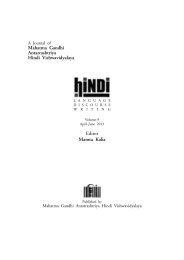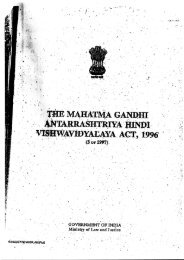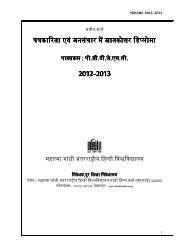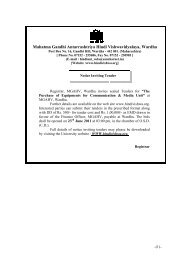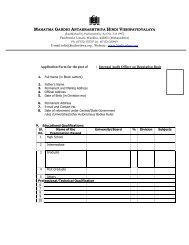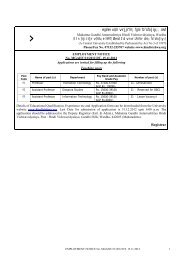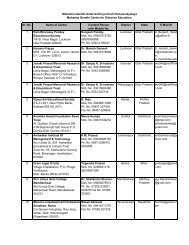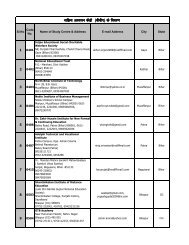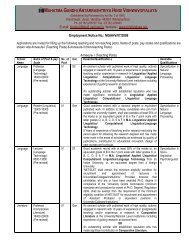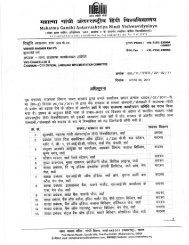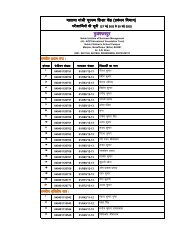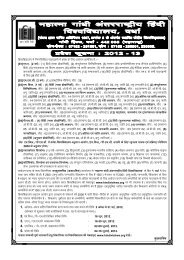Dr. B.R. Ambedkar's Contribution in Anthropology
Dr. B.R. Ambedkar's Contribution in Anthropology
Dr. B.R. Ambedkar's Contribution in Anthropology
You also want an ePaper? Increase the reach of your titles
YUMPU automatically turns print PDFs into web optimized ePapers that Google loves.
INVITATIONINTERNATIONAL SEMINARON<strong>Dr</strong>. B.R. Ambedkar’s <strong>Contribution</strong> <strong>in</strong> <strong>Anthropology</strong>March 29 th - 31 st , 2012Organized ByCentre for <strong>Dr</strong>. Ambedkar StudiesCentre for Buddhist StudiesVenueMahatma Gandhi Antarrashtriya H<strong>in</strong>di Vishwavidyalaya,Gandhi Hills,Wardha-442005, MaharashtraWebsite: www.h<strong>in</strong>divishwa.org
Concept Note<strong>Dr</strong>. B.R.Ambedkar presented his paper "Castes <strong>in</strong> India: TheirMechanism, Genesis and Development" at an <strong>Anthropology</strong> sem<strong>in</strong>ar (1916),<strong>in</strong> which he started with the follow<strong>in</strong>g statement: “I need hardly rem<strong>in</strong>d youof the complexity of the subject I <strong>in</strong>tend to handle. Subtler m<strong>in</strong>ds and ablerpens than m<strong>in</strong>e have been brought to the task of unravel<strong>in</strong>g the mysteries ofCaste; but unfortunately it still rema<strong>in</strong>s <strong>in</strong> the doma<strong>in</strong> of the "unexpla<strong>in</strong>ed,"not to say of the "un-understood." I am quite alive to the complex <strong>in</strong>tricaciesof a hoary <strong>in</strong>stitution like Caste, but I am not so pessimistic as to relegate itto the region of the unknowable, for I believe it can be known. The casteproblem is a vast one, both theoretically and practically. Practically, it is an<strong>in</strong>stitution that portends tremendous consequences. It is a local problem, butone capable of much wider mischief, for "as long as caste <strong>in</strong> India doesexist, H<strong>in</strong>dus will hardly <strong>in</strong>termarry or have any social <strong>in</strong>tercourse withoutsiders; and if H<strong>in</strong>dus migrate to other regions on earth, Indian castewould become a world problem." Theoretically, it has defied a great manyscholars who have taken upon themselves, as a labour of love, to dig <strong>in</strong>to itsorig<strong>in</strong>. Such be<strong>in</strong>g the case, I cannot treat the problem <strong>in</strong> its entirety. Time,space and acumen, I am afraid, would all fail me, if I attempted to dootherwise than limit myself to a phase of it, namely, the genesis, mechanismand spread of the caste system. I will strictly observe this rule, and willdwell on extraneous matters only when it is necessary to clarify or support apo<strong>in</strong>t <strong>in</strong> my thesis…………….Ethnically all people are heterogeneous. It is the unity of culture thatis the basis of homogeneity. Tak<strong>in</strong>g this for granted, I venture to say thatthere is no country that can revive Indian Pen<strong>in</strong>sula with respect to the unityof this culture. It has not only a geographic unity, but it has over and aboveall a deeper and a much more fundamental unity- the <strong>in</strong>dubitable cultureunity that covers the land from end to end.”Before <strong>Dr</strong>. Ambedkar there were several sociologists andanthropologists who studied the Indian social system. But the credit shouldgo to him for a comprehensive theoretical articulation on the caste system.His early writ<strong>in</strong>gs were under the umbrella of anthropology. In 1916 hepresented his thesis on the caste system, entitled “Castes <strong>in</strong> India: Theirmechanism, Genesis and Development”. The thesis was presented <strong>in</strong> the<strong>Anthropology</strong> Sem<strong>in</strong>ar at Columbia University <strong>in</strong> N.Y. Half a century ago;
<strong>Dr</strong>. Ambedkar surveyed the exist<strong>in</strong>g data on the physicalanthropology of the different castes <strong>in</strong> his book The Untouchables. Hefound that the received wisdom of a racial basis of caste was not supportedby the data. He was a great anthropologist. His writ<strong>in</strong>gs on Indian socialsystem are of anthropological perspective. There are countless books,articles and research papers of <strong>Dr</strong>. Ambedkar on social and cultural system.____________________________________<strong>Anthropology</strong> Sem<strong>in</strong>arof<strong>Dr</strong>. A. A. Goldenweizer atThe Columbia University, New York, U.S.A. on 9th May 1916Source: Indian Antiquary, May 1917, Vol. XLI________________________________________________________Under this background some of the thrust areas and sub themes of thesem<strong>in</strong>ar are.1) Study of caste2) Caste Annihilation3) <strong>Dr</strong>. Ambedkar’s theory of “The Broken Men”.4) Untouchability and Slavery: Which is worst?5) Any other related theme.
Abstracts and PapersThe paper will be <strong>in</strong> English and H<strong>in</strong>di. The abstract, not exceed<strong>in</strong>g 300words typed <strong>in</strong> MS Word (Font- Times New Roman, Size-12), (KrutiDev/Unicode FontSize-14) mention<strong>in</strong>g title, name(s) of author(s) andaddress should reach via e-mail dr.ambedakaranthropology@gmail.comby March 25 th 2012.RegistrationRegistration is compulsory for all delegates. There will be on-the-spotregistration for outstation delegates. For all the local delegates, last date forregistration is March 25 th , 2012. Registration fee is Rs 600/- for allparticipants.About the University and DepartmentsMahatma Gandhi Antarrashtriya H<strong>in</strong>di Vishwavidyalaya is a centraluniversity established <strong>in</strong> 1997 with a view to enrich H<strong>in</strong>di language andliterature by teach<strong>in</strong>g and research. There are four schools <strong>in</strong> the universityviz- School of Culture, School of Literature, School of Language and Schoolof Translation and Interpretation. The Centre for <strong>Dr</strong>. Ambedkar Studies andCentre for Buddhist Studies comes under the School of Culture.About the cityThe Prayer of Sewagram, march of Paunar and the Ashti’s Revolut<strong>in</strong>aryfreedom is noth<strong>in</strong>g but the soul of Wardha District. As of the other districts<strong>in</strong> Maharashtra State, though Wardha District is smaller <strong>in</strong> area but greaterwith its fame. In the year 1934, Mahatma Gandhi came at Wardha. Heselected the Segao as his function<strong>in</strong>g land with Shri Jamanalal Bajaj. Furtherthe Segaon renamed as Sewagram. Afterward Wardha district is found moreimportant not only <strong>in</strong> India but <strong>in</strong> World also.In Indian freedom movement,Sewagram and Wardha District became immortal. As per the Gandhiji’sdirections, Aacharya V<strong>in</strong>oba Bhave settled at Paunar and constituted theAshram on the bank of river Dham at the Wardha-Nagpur road.Wardhadistrict is situated at Western side of Wardha-Va<strong>in</strong>ganga vallies <strong>in</strong> South -East Maharashtra. District is covered with Satpuda Hills at the north whereas Western side is occupied by the vallies of river Purna. The plane Plato ofthe Nagpur District is at Eastern side where as the river Wardha flows fromthe boundaries of the North, West and South.
How to reach the venue?Wardha bus stand and railway station is about 6 Kms. from theuniversity campus. The Sevagram railway station is around 8 Kms &Nagpur railway station is 80 Kms from the campus. Railway services arefrequently available from Nagpur railway station to Sevgram and Wardha.PatronShri Vibhuti Narayan RaiVice ChancellorCo- PatronProf. A. Arv<strong>in</strong>dakshanPro- Vice ChancellorAdvisory Committee<strong>Dr</strong>. Kailash Khamre,Prof. K.K.S<strong>in</strong>gh, Prof.B.M.MukherjeeSem<strong>in</strong>ar ConvenerProf. M. L. KasareOrganiz<strong>in</strong>g Secretaries<strong>Dr</strong>.Nisheeth Rai, <strong>Dr</strong>.Surjeet K.S<strong>in</strong>gh,Virendra P.Yadav,Ravi Shankar S<strong>in</strong>gh,Ram Gopal Meena ,Laxman Prasad.ContactsEmail: dr.ambedakaranthropology@gmail.comMob. 09545200077, 09579879402,09923766299



